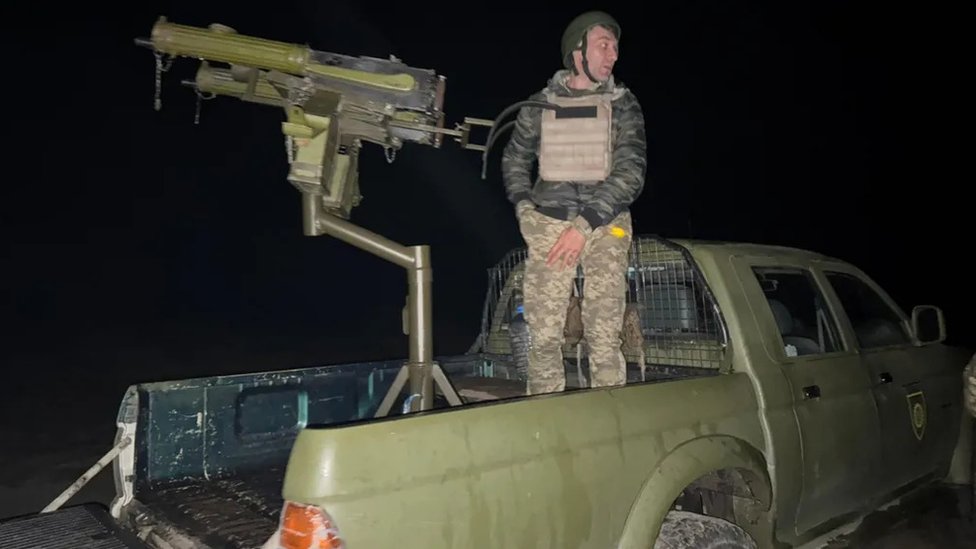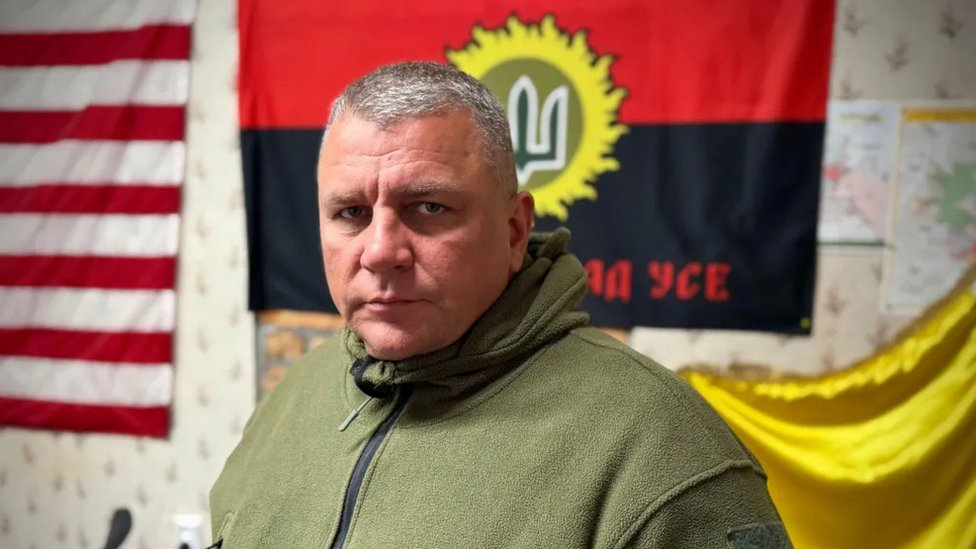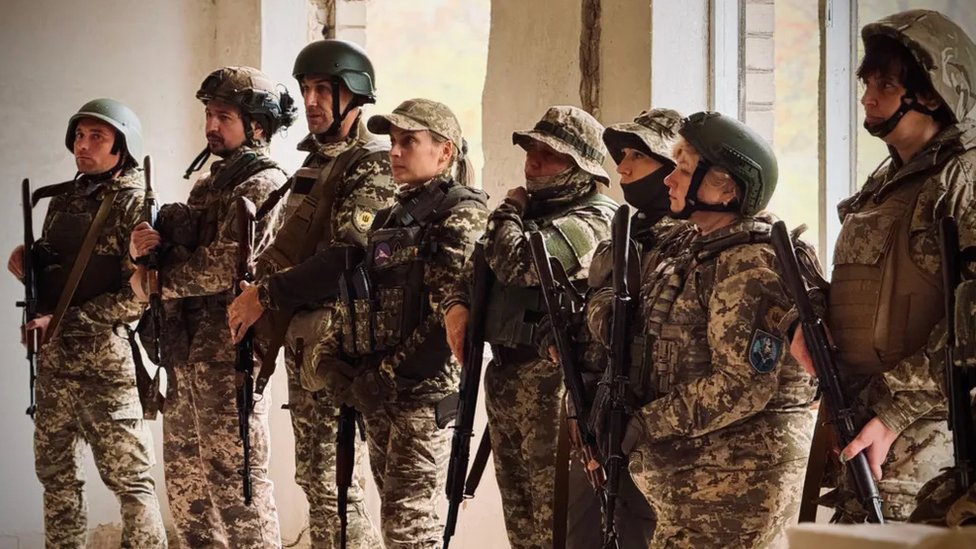When it gets dark over Buča, its “witches” go outside and start fighting against Russian drones.
As more and more Ukrainians head to the front lines, an all-female volunteer air defense unit – calling themselves the “Witches of Bucha” – is helping to defend Ukraine’s skies.
The Russian military often launches drones in waves, in order to overload Ukrainian defenses against a missile attack.
This mostly happens after dark, when the “witches” work.
In fact, night shifts allow them to balance their contribution to the country’s defense with their daily duties, such as teachers, doctors – and even a manicurist.
Many say that this is one way to overcome the helplessness they felt when Russian forces occupied the Buce area at the beginning of the invasion.
The gruesome stories from those weeks – among them murders, torture and abductions – only began to emerge in late March 2022, when Ukrainian forces liberated the area.
Airstrikes and ancient weapons
“I’m 51 years old, I weigh one hundred kilos, I can’t run. I thought they were going to send me home, but they took me in,” recalls Valentina, a veterinarian who signed up to shoot down drones this summer.
Now it bears the military nickname “Valkyrie”.
When asked about the reasons for going to the army, he talks about friends sent to the front and others who died in battles.
“I know how to do this job. The equipment is heavy, but we women can do it.”
A few hours later, when the air traffic alert sounded, she got the chance to show it in action.
Her unit rushes from the base in the forest, and we follow their truck through the darkness as it trucks towards the center of the field.
A team of four jumps out and deploys weapons.
The machine guns are from another time – two Maxims made in 1939, ammunition boxes marked with red stars from the Soviet days.
Serhij, the only man in the team, has to pour bottled water by hand as a coolant.
This is all they have at their disposal – the best Ukrainian equipment is at the front, and the country is constantly asking for more from its allies.
But the ancient weapon is impeccably preserved, and Witches they say they have shot down three drones since the flight.

“My role is to listen to them,” explains Valentina.
“It is a very tense task. But we have to stay focused, pay attention to even the quietest sound.”
Her friend Ina is also in her early fifties and went out on one of her first errands.
“It’s terrible, it is. But so is childbirth, so I had it three times again,” she laughs, telling me that her military nickname is “Cherry”.
“Because of my car, not because of tomatoes.”
Being a math teacher, she occasionally has to rush back from the forest to teach her class.
“I keep my clothes in the car. My heels. I put on some lipstick, give a class. Then back in the car, a quick change around the corner and on the road again.
“The boys left, but we stayed. What can’t Ukrainian women do? We can do everything.”

Somewhere on the horizon, a pillar of light from another group can be seen, scanning the sky for danger above their patrol zone.
There is no public data on the total number of volunteer units – or how many women participate in them.
But while Russia sends drones packed with explosives almost every night, they help raise an additional shield around major cities and towns.
With position A witch in the field, Julija finds two drones on her tablet.
They are flying over the neighboring area, so there is no immediate danger to Butch, but the machine guns will remain on standby until the alert is over.
There are no men left
The commander of the volunteers is a bear of a man, who has just returned from Pokrovskoe in eastern Donbass, where the fighting is fiercest.
“There are fireworks, non-stop,” describes Andrij Verlati with a smile.
There used to be about two hundred men in the mobile anti-aircraft defense units in the Buce region, who also patrolled during the night curfew, but today many of them are unfit for military service.
Ukraine then changed the law on mobilization, when it urgently needed more soldiers, and many of the colonel’s team suddenly found themselves eligible for the front line.

“About 90 percent of my people ended up in the army, and 10 percent of them went into hiding, running away like rats. We have almost no one left,” says Colonel Verlati bluntly.
“Only men without legs and half a skull.”
That’s why he had a choice – to fill the places in the unit with men below the age limit for mobilization or to recruit women.
“At first it sounded like a joke: ‘Let’s get women!’ There was not much trust in them in the armed forces. But that has really changed over time,” he says.
Taking back control
The witches spend their weekends in general military training.
On the day we visited, their first lesson was breaking into a building.
They practice in the ruins of the farm’s summer kitchen, pushing the barrels of their rifles into the empty corridors before cautiously moving on.
Some manage to look more believable than others, but the dedication and focus of the women is evident – because their reasons for doing this are deep and personal.
“I remember the occupation. I remember the horror. I remember the screams of my own child,” Valentina tells me, with small sighs.
“I remember the dead bodies as we ran away.”
Her family fled from Buca past burnt out tanks, dead soldiers and civilians.
At a Russian checkpoint, she says a soldier forced her to roll down her car window and then put a gun barrel to her son’s head.
She is filled with quiet rage.
Valentina also refuses to stop believing in Ukraine’s victory, despite the gloomy mood that has gripped much of the country after nearly 1,000 days of war.
“Life changed, all our plans fell apart. But I am here to help hasten the end of this war. As our girls here are wont to say – it won’t end without us.”

Crunching over broken glass and debris in military boots, with a rifle in her hands, office manager Anja is another A witch.
At 52, she finds military training invigorating.
“Under the occupation, I felt the complete meaninglessness of my own existence. I could neither help anyone else nor protect myself. I wanted to learn how to handle a weapon, so I could be at least of some use.”
There is a lot of responding to the instructors, the women clearly enjoy this.
But later that night, at their base in the woods, one of them opens up even more and tells everyone a terrible story.
When Buča was occupied, Russian forces began to go from house to house.
They raped and killed.
And then, one day, a rumor spread that the occupiers were coming to kill the children.
“Because of the decision I made that day, I will never forgive the Russians,” confides this woman.
I won’t go into the details of what she told me – the extreme decision she made – only that the soldiers never came and she never had to put that decision into action.
But this woman has been haunted by that moment ever since, just like the guilt.
The first time she felt relief was when she started learning how to defend herself, her family, and her country.
“Coming here really helped me,” she tells me calmly.
“Because I will never sit back like a victim and be so scared again.”
BBC is in Serbian from now on and on YouTube, follow us HERE.

News
Source: www.vijesti.me


